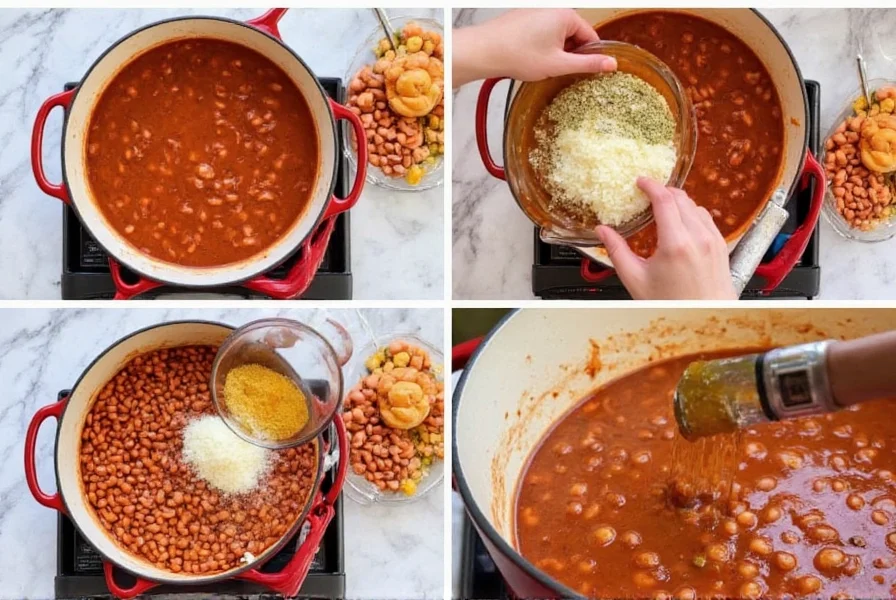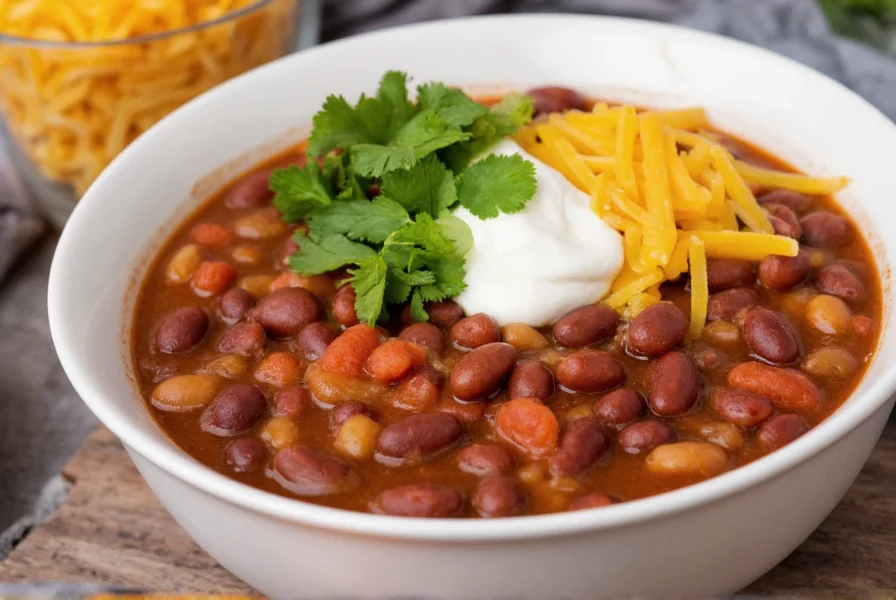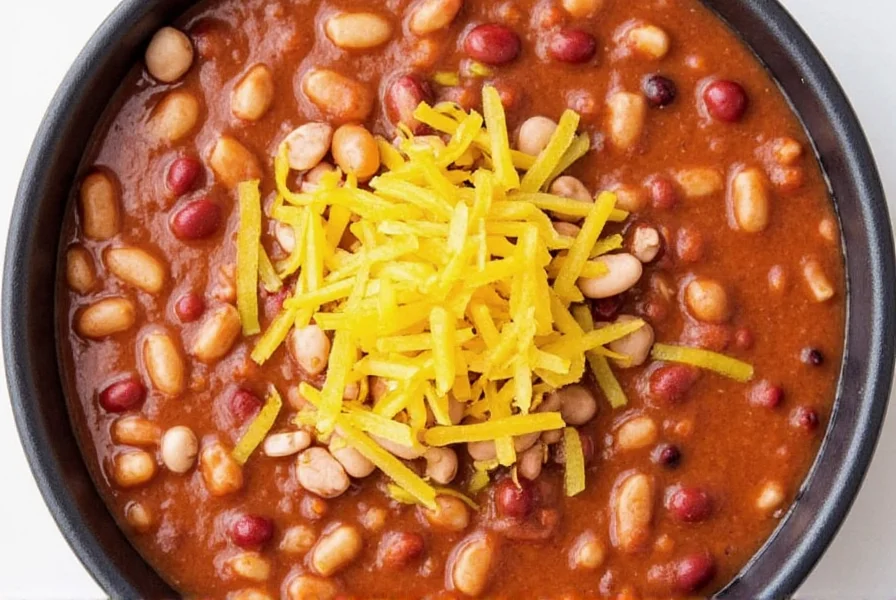The perfect bean chili recipe combines 2 cups cooked kidney beans, 1 can diced tomatoes, 1 onion, 3 cloves garlic, 2 tbsp chili powder, 1 tsp cumin, and vegetable broth simmered for 30 minutes. This foundational recipe creates a hearty, flavorful chili that's naturally vegetarian and easily customizable with protein additions or spice adjustments.

Mastering the Art of Bean Chili: A Culinary Staple
Bean chili represents one of America's most beloved comfort foods, evolving from ancient Mesoamerican traditions to modern kitchen staple. Unlike meat-centric versions, bean chili showcases legumes as the star ingredient, offering exceptional nutrition while maintaining deep, complex flavors. Whether you're cooking for a weeknight dinner or preparing for game day, understanding the fundamentals of bean chili preparation ensures consistently delicious results.
Essential Bean Chili Recipe
This straightforward bean chili recipe serves four and requires common pantry ingredients. The magic happens through proper layering of flavors and attention to cooking technique rather than exotic components.
| Ingredient | Measurement | Preparation Notes |
|---|---|---|
| Kidney beans | 2 cups cooked | Rinse thoroughly if using canned |
| Diced tomatoes | 1 (28-ounce) can | Fire-roasted adds depth |
| Yellow onion | 1 large, diced | Cook until translucent |
| Garlic cloves | 3, minced | Add after onions |
| Chili powder | 2 tablespoons | Quality brand matters |
| Ground cumin | 1 teaspoon | Toast for enhanced flavor |
| Vegetable broth | 2 cups | Low-sodium preferred |
| Olive oil | 2 tablespoons | For sautéing |
Step-by-Step Preparation Guide
Follow these professional techniques to elevate your bean chili from ordinary to exceptional:
Building Flavor Foundations
Heat olive oil in a heavy-bottomed pot over medium heat. Add diced onions and cook until translucent (about 5 minutes), then incorporate minced garlic and cook for 30 seconds until fragrant. This gentle cooking process develops sweetness without burning.
Spice Bloom Technique
Add chili powder and cumin directly to the oil-onion mixture, stirring constantly for 1 minute. This 'blooming' process activates essential oils in the spices, creating significantly deeper flavor than adding spices later. Immediately follow with diced tomatoes (including juices) to stop the cooking process.
Bean Integration and Simmering
Add cooked kidney beans and vegetable broth, bringing the mixture to a gentle simmer. Reduce heat to low and cook uncovered for 30 minutes, stirring occasionally. This uncovered simmering concentrates flavors while allowing excess liquid to evaporate, creating perfect chili consistency.
Ingredient Science: Why Each Component Matters
Understanding the role of each ingredient transforms you from recipe follower to skilled chili maker:
Bean Selection and Preparation
Kidney beans provide the traditional chili texture, but black beans or pinto beans work beautifully. Always rinse canned beans thoroughly to remove excess sodium and the starchy liquid that can make chili gluey. For superior texture, consider cooking dried beans yourself with a pinch of baking soda added to the soaking water.
Tomato Product Selection
Fire-roasted diced tomatoes add subtle smokiness that enhances the chili profile. Avoid tomato paste as the primary tomato component in bean chili, as it creates overly thick consistency. The natural acidity of tomatoes balances the earthiness of beans and spices.
Spice Quality Considerations
Fresh spices make a dramatic difference—chili powder loses potency after 6 months. Consider toasting whole cumin seeds in a dry pan before grinding them for maximum flavor impact. For authentic depth, add a small piece of dark chocolate during the final 10 minutes of cooking.

Popular Bean Chili Variations
Adapt this foundational recipe to suit different dietary needs and flavor preferences:
Texas-Style Bean Chili
Omit tomatoes entirely for this purist approach. Increase chili powder to 3 tablespoons and add 1 teaspoon smoked paprika. Simmer for 45 minutes to develop richer flavor. This authentic variation focuses on pure bean and spice harmony without acidic components.
Quick 30-Minute Bean Chili
Use two varieties of pre-cooked beans (kidney and black) to skip lengthy cooking times. Add 1 cup frozen corn during the final 5 minutes. This easy bean chili recipe for beginners maintains flavor while significantly reducing preparation time.
Protein-Enhanced Versions
For those seeking additional protein, brown 1 pound ground turkey before adding onions. Alternatively, stir in 1 cup cooked quinoa during the final 10 minutes for complete plant-based protein. These healthy bean chili recipe adaptations maintain the vegetarian foundation while boosting nutritional profile.
Common Mistakes and Professional Solutions
Avoid these frequent bean chili pitfalls with expert corrections:
Problem: Watery Consistency
Solution: Simmer uncovered for additional 10-15 minutes. Alternatively, mash 1/2 cup beans against the pot side to naturally thicken the chili. Never use flour or cornstarch, which creates unnatural texture.
Problem: Bland Flavor Profile
Solution: Add acidity to brighten flavors—1 tablespoon apple cider vinegar or fresh lime juice during final minutes. A pinch of cayenne pepper can also elevate existing spice notes without making chili overly hot.
Problem: Mushy Bean Texture
Solution: Add beans during the last 15 minutes of cooking rather than at the beginning. For canned beans, rinse thoroughly and add later in the process. When using dried beans, undercook slightly before adding to chili.
Serving and Storage Recommendations
Bean chili actually improves in flavor after resting, making it ideal for meal prep. Store in airtight containers for up to 5 days in the refrigerator or freeze for up to 3 months. When reheating, add a splash of broth to restore ideal consistency.
For serving, provide traditional toppings like sour cream, shredded cheese, and fresh cilantro, but also consider innovative options like avocado slices, pickled red onions, or a drizzle of chipotle crema. Bean chili also works beautifully as a topping for baked potatoes or stirred into cornbread batter.
Frequently Asked Questions
Can I make bean chili without tomatoes?
Yes, authentic Texas-style bean chili omits tomatoes entirely. Replace the liquid with additional vegetable broth and increase chili powder by 1 tablespoon. The resulting chili has a richer, more concentrated bean flavor that many traditionalists prefer.
How do I make my bean chili thicker naturally?
The best method for thickening bean chili without altering flavor is to simmer uncovered for additional 10-15 minutes. Alternatively, remove 1 cup of chili, blend until smooth, then return to the pot. This technique maintains flavor integrity while achieving perfect restaurant-style consistency.
What's the difference between vegetarian and vegan bean chili?
Traditional bean chili is naturally vegan when prepared with vegetable broth and without dairy toppings. The distinction matters primarily for serving—vegan versions exclude all animal products including cheese and sour cream, while vegetarian versions may include these dairy toppings. Always specify when sharing with guests who have dietary restrictions.
Can I use dried beans instead of canned for bean chili?
Absolutely. Use 1 cup dried beans (yields about 2.5 cups cooked). Soak overnight, then cook until tender but not mushy before adding to chili. Dried beans provide superior texture and allow you to control sodium content, though they require additional preparation time compared to canned options.











 浙公网安备
33010002000092号
浙公网安备
33010002000092号 浙B2-20120091-4
浙B2-20120091-4